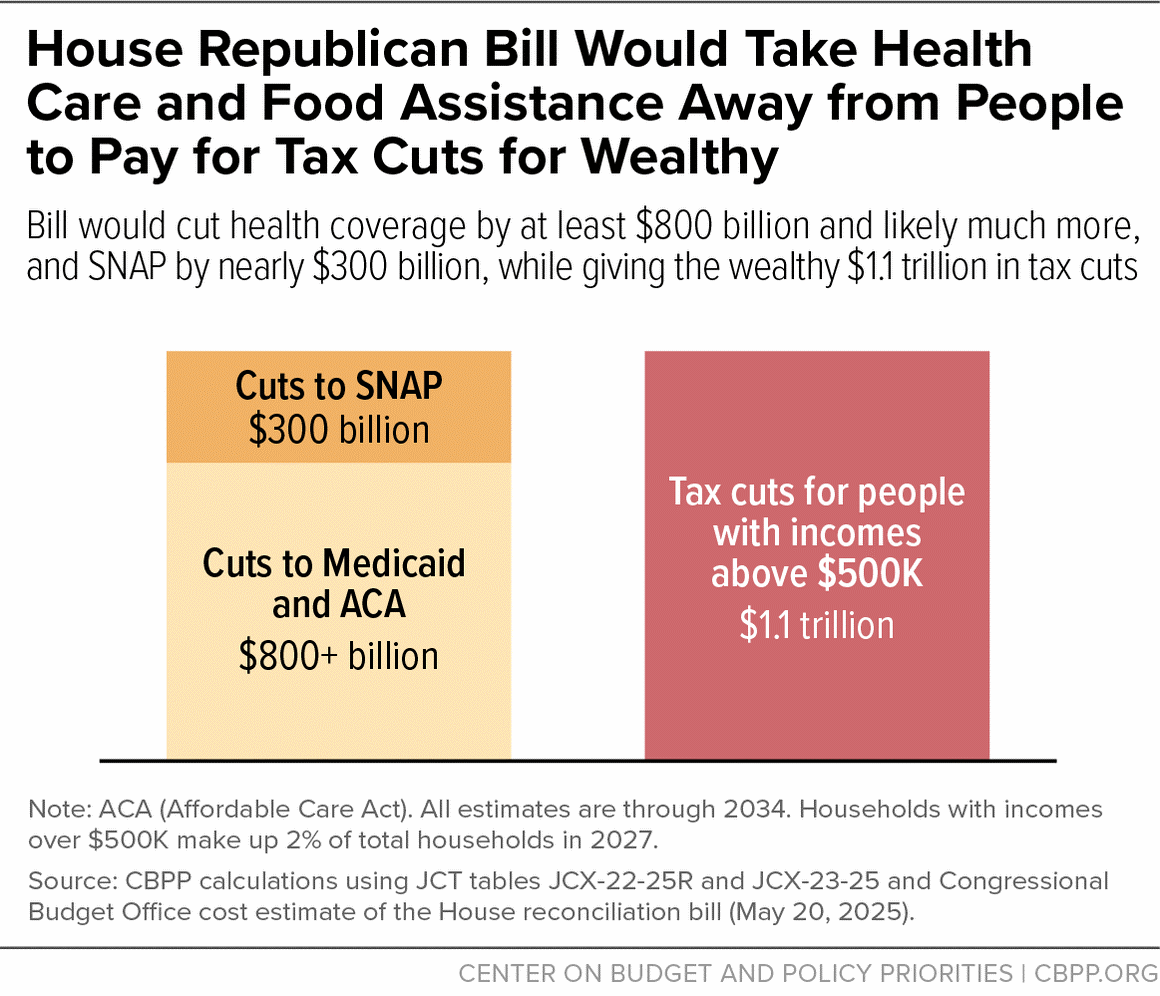|
|
House Passes One Big, Brutal Budget Bill — Seniors' Health and Security at Risk |
|
In the early hours of Thursday morning, House Republicans narrowly passed their budget proposal, the “One Big Beautiful Bill Act” (H.R. 1), by a vote of 215-214. The legislation now moves to the Senate for consideration.
The vote was deeply divided. Only two Republicans — Representatives Thomas Massie (KY) and Warren Davidson (OH) — joined all Democrats in opposing the measure. Representatives David Schweikert (AZ) and Andrew Garbarino (NY) missed the vote but indicated they would have supported it.
The bill includes $715 billion in cuts to Medicaid and $300 billion to food assistance programs over the next decade. These cuts would be used to fund massive tax breaks for billionaires and large corporations. According to analysts, individuals earning $1 million or more per year would receive nearly $90,000 annually in tax breaks, while families earning under $50,000 would get less than $1 a day in relief.
The scale of the health care cuts is historic and is expected to cause at least 13 million Americans of all ages to lose coverage and jeopardize the operation of hospitals and nursing homes, particularly in rural communities.
Medicaid is particularly important to seniors, serving some of the most vulnerable Americans including 860,000 who rely on it to pay for nursing home care and another 5.6 million who receive home care services and supports funded by Medicaid. 11.5 million Medicare beneficiaries also rely on Medicaid to help pay for prescription drugs, co-pays, and other medical services.
In the case of food assistance, nearly 11 million people could see at least some cut in Supplemental Nutrition Assistance Program (SNAP) benefits due to expansions to burdensome paperwork requirements included in the legislation and shifting costs to the states. 6.5 million seniors receive food assistance today. |
|
|
“This bill takes food and health care away from those who need it most, just to fund tax giveaways for the wealthiest,” said Robert Roach, Jr., President of the Alliance for Retired Americans. “It’s outrageous, and we cannot let it become law. We must raise our voices and demand the Senate put a stop to this insane cruelty.”
|
|
CBO Warns: New House Budget Proposal Could Slash Medicare by $490 Billion |
|
A new report from the nonpartisan Congressional Budget Office (CBO) has sounded the alarm: the budget recently passed by the U.S. House of Representatives could result in nearly $500 billion in automatic Medicare cuts over the next ten years.
The bill would add $2 trillion to the federal deficit, triggering automatic cuts under existing budget rules. Beginning in 2027, these cuts would slash Medicare payments by 4 percent each year — affecting hospitals, doctors, Medicare Advantage plans, and prescription drug plans.
“This bill is not just a broken promise — it’s a betrayal,” said Richard Fiesta, Executive Director of the Alliance for Retired Americans. “Older Americans worked a lifetime to earn their Medicare benefits, and this legislation puts those benefits at risk while handing out tax breaks to the wealthiest.” |
|
Drug Industry Quietly Funds “Patient Advocacy” Groups to Fight Medicare Drug Price Negotiations |
|
A new investigation by Patients for Affordable Drugs (P4AD) has uncovered a troubling tactic used by the pharmaceutical industry to protect profits and keep drug prices high: secretly funding so-called “patient advocacy” groups.
The report profiles six such groups all of which have deep financial ties to the drug industry.
These groups receive substantial funding from PhRMA, the powerful trade group representing drug manufacturers, as well as other wealthy pharmaceutical donors. Many are also staffed with former drug company executives and lobbyists. Despite their names, these organizations are not advocating for patients — they are working to protect corporate profits.
Their latest target? Medicare’s new power to negotiate lower drug prices, a long-overdue reform that could bring real relief to seniors. These front groups are spending thousands on misleading ads and social media campaigns designed to scare the public and weaken support for lower drug prices.
“Our voices are powerful - that’s why the drug corporations invest millions to create the illusion of public support,” said Joseph Peters, Jr., Secretary-Treasurer of the Alliance. “We must keep the focus on the high prices Americans are paying for prescription drugs and stand up to these powerful corporations.” |
|
KFF Health News: Trump’s DOJ Accuses Medicare Advantage Insurers of Paying ‘Kickbacks’ for Primo Customers |
|
When people call large insurance brokerages seeking free assistance in choosing Medicare Advantage plans, they’re often offered assurances such as this one from eHealth: “Your benefit advisors will find plans that match your needs — no matter the carrier.”
About a third of enrollees do seek help in making complex decisions about whether to enroll in original Medicare or select among private-sector alternatives, called Medicare Advantage.
Now a blockbuster lawsuit filed May 1 by the federal Department of Justice alleges that insurers Aetna, Elevance Health (formerly Anthem), and Humana paid “hundreds of millions of dollars in kickbacks” to large insurance brokerages — eHealth, GoHealth, and SelectQuote. The payments, made from 2016 to at least 2021, were incentives to steer patients into the insurer’s Medicare Advantage plans, the lawsuit alleges, while also discouraging enrollment of potentially more costly disabled beneficiaries.
|
|
Thanks for reading. Every day, we're fighting to lower prescription drug prices and protect retirees' earned benefits and health care. But we can't do it without your help. Please support our work by donating below. |
|
|
|
|
Alliance for Retired Americans | 815 16th Street, NW | Washington, DC 20006 | www.retiredamericans.org


